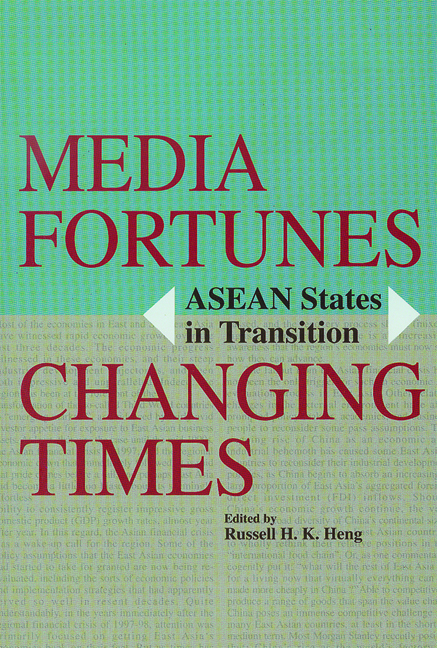Book contents
- Frontmatter
- Contents
- Foreword Wolfgang Möllers
- Acknowledgements
- Contributors
- Introduction
- Chapter 1 Media in Southeast Asia: A Literature Review of Post-1980 Developments
- Chapter 2 Cambodian Media in a Post-Socialist Situation
- Chapter 3 Industrialized Media in Democratizing Indonesia
- Chapter 4 Indonesian Television and the Dynamics of Transition
- Chapter 5 The Impact of Economic Transition on the Media in Laos
- Chapter 6 The Media and Malaysia's Reformasi Movement
- Chapter 7 Myanmar Media: Meeting Market Challenges in the Shadow of the State
- Chapter 8 Singapore: Media at the Mainstream and the Margins
- Chapter 9 Offending Images: Gender and Sexual Minorities, and State Control of the Media in Thailand
- Chapter 10 Vietnamese Media in Transition: The Boon, Curse, and Controversy of Market Economics
- Index
Chapter 5 - The Impact of Economic Transition on the Media in Laos
Published online by Cambridge University Press: 03 November 2017
- Frontmatter
- Contents
- Foreword Wolfgang Möllers
- Acknowledgements
- Contributors
- Introduction
- Chapter 1 Media in Southeast Asia: A Literature Review of Post-1980 Developments
- Chapter 2 Cambodian Media in a Post-Socialist Situation
- Chapter 3 Industrialized Media in Democratizing Indonesia
- Chapter 4 Indonesian Television and the Dynamics of Transition
- Chapter 5 The Impact of Economic Transition on the Media in Laos
- Chapter 6 The Media and Malaysia's Reformasi Movement
- Chapter 7 Myanmar Media: Meeting Market Challenges in the Shadow of the State
- Chapter 8 Singapore: Media at the Mainstream and the Margins
- Chapter 9 Offending Images: Gender and Sexual Minorities, and State Control of the Media in Thailand
- Chapter 10 Vietnamese Media in Transition: The Boon, Curse, and Controversy of Market Economics
- Index
Summary
INTRODUCTION
In the Lao People's Democratic Republic (LPDR), the media plays the important role of acting as a bridge between the government and the people, by providing information through a system of two-way communication to promote and protect national interests. The Lao media carries out these duties within the framework of a socialist press that is owned by the state and managed by state-appointees.
A major event in the LPDR's recent history that has a great impact on Laotian society in general, and the media in particular, took place in 1986. That year, the Lao Government started to open the country to the world. Laos’ social, economic and human resources have developed dramatically since then. The government now actively encourages private investment, both foreign and domestic, by offering incentives to investors such as the reduction of corporate taxes, duties and turnover taxes on imported capital equipment and inputs to production. Foreign investments can come in the form of fully-owned foreign companies or of joint ventures with local partners.
As a result of the encouragement of private investment, Lao people have the opportunity to choose from a wider range of jobs and to increase their incomes. Investments after 1986 initially came from family businesses and were mainly in light and medium industries. Within this positive economic climate, some newspapers, magazines, radio stations and television channels were launched. They steadily grew through the widening of friendly relationships and economic cooperation with foreign countries and international organizations. As the government steadily opened the country, journalists have played a more active role in reporting developments in the country.
From 1986 to 1993, economic and media reforms were still carried out with great caution. This caution arose because during this time formerly socialist countries, especially the Soviet Union and Eastern European countries, underwent a total change in their political system from socialism to capitalism. Some of these countries have since experienced civil war or have had conflicts among political parties and minority groups. The dislocations these countries experienced have hindered social and economic development. Laos has avoided such radical changes and its socio-economic development has moved gradually forward while its political system has remained stable.
From 1993, the LPDR increased the momentum of its reforms programme, and this had its impact on the country's media.
- Type
- Chapter
- Information
- Media Fortunes, Changing TimesASEAN States in Transition, pp. 107 - 118Publisher: ISEAS–Yusof Ishak InstitutePrint publication year: 2002



